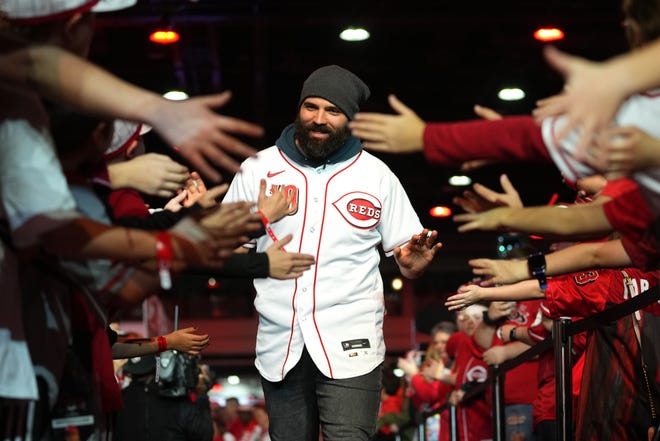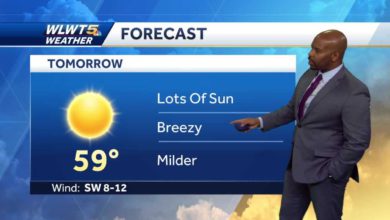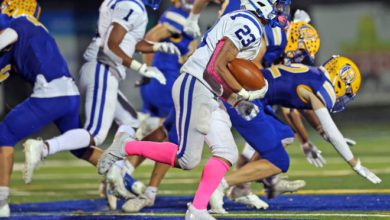
Subways will roll all night, and restaurants, shops and gyms will drop their capacity limits as New York sheds most of the restrictions that have financially hobbled the city and its residents for more than a year, Gov. Andrew Cuomo announced Monday.
Social distancing still must be maintained, Cuomo said. But starting May 17, subways will no longer close from 2 a.m.-4 a.m. New York state, New Jersey and Connecticut will drop indoor capacity limits May 19.
"This is major reopening of economic and social activity," Cuomo said.
Over 80,000 city workers returned to their offices Monday, New York Mayor Bill de Blasio said.
"City Hall is abuzz today. It's a great feeling," the mayor said. " I have been at City Hall throughout the pandemic, as have many of my colleagues. But for the first time in, you know, a year-plus, we really have the spirit and the energy of this place back. And it's a great feeling."
Also in the news:
►British Prime Minister Boris Johnson said travel from foreign countries could begin to open up on May 17, and that social distancing requirements of 1 meter -- a little over 3 feet -- would probably be lifted by June 21.
►The Small Business Administration on Monday began accepting applications for grants from the Restaurant Revitalization Fund. Thousands of restaurants and bars decimated by the pandemic are eligible for $28.6 billion in grants.
►With the pandemic appearing to ebb, Hard Rock said it will spend $20 million in Atlantic City, N.J., to renovate hotel suites, open a Starbucks outlet, purchase new slot machines and tables games, add a new restaurant and upgrade its beachfront.
►Los Angeles County public health authorities reported no new COVID-19 deaths Sunday. Infections remain at their lowest levels since the start of the pandemic.
? Today's numbers: The U.S. has more than 32.4 million confirmed coronavirus cases and 577,000 deaths, according to Johns Hopkins University data. The global totals: Over 153 million cases and 3.2 million deaths. More than 312.5 million vaccine doses have been distributed in the U.S. and 246.7 million have been administered, according to the Centers for Disease Control and Prevention. More than 105.5 million Americans have been fully vaccinated.
? What we're reading: California is reopening again as the state's coronavirus cases plummet. But critics say the "extreme measures" to fight the virus were too much.
Keep refreshing this page for the latest updates. Want more? Sign up for our Coronavirus Watch newsletter for updates to your inbox and join our Facebook group.
Biden doesn't commit to herd immunity
President Joe Biden didn’t directly answer when asked Monday when the nation will reach herd immunity. After touting the progress made on vaccinations, Biden said there’s a dispute over what share of the population needs to be vaccinated to achieve herd immunity. Rather than giving his opinion on that figure, Biden encouraged anyone who hasn’t received a shot to get one.
“I think, by the end of the summer, we’ll be in a very different position than we are now,” Biden said.
– Maureen Groppe
Patients under 50 make up largest group hospitalized with COVID
Even with new coronavirus infections slowly declining in the U.S., hospitals are still getting a significant number of COVID 19 patients, except they tend to be younger now.
Those under 50 make up the largest portion of COVID hospitalizations in the nation at about 35%, as a disease that initially ravaged the senior ranks is victimizing other unprotected adults.
Lower vaccination rates among younger people, along with the spread of variants -- especially the B.1.1.7 strain first identified in England -- are contributing to the demographic change.
"We're now seeing people in their 30s, 40s and 50s — young people who are really sick," Dr. Vishnu Chundi, an infectious disease physician and chair of the Chicago Medical Society's COVID-19 task force, told NPR. "Most of them make it, but some do not. ... I just lost a 32-year-old with two children, so it's heartbreaking."
A nationwide effort to prioritize seniors for vaccinations has paid off, as 83% of people 65 and older have received at least one shot and 70% are fully vaccinated. A recent CDC study shows fully vaccinated seniors are 94% less likely to be hospitalized with COVID than those who are not inoculated.
New US cases declining steadily as vaccinations roll on
The United States is now averaging fewer than 50,000 new coronavirus cases per day, a level not seen since early October and a sign that the nation's mass vaccination program is having an impact on the pandemic. In the week ending Sunday, the U.S. reported 344,463 cases. The daily average is down about 22,000 cases each day from a small peak seen three weeks ago. It's down much further from the records set in January; the U.S. is now reporting as many cases in a week as it was getting every two days then.
Helping the cause: Almost 148 million Americans have received at least one dose of a vaccine, and over 40% of U.S. adults are fully vaccinated.
Globally, however, daily deaths and new cases remain at or near all-time highs, driven to a great extent by India's well-documented struggles. And India's reported data is is generally considered to be just a fraction of the true numbers across the nation of 1.4 billion people.
– Mike Stucka
Florida Gov. DeSantis jettisons local mask, social distancing requirements
Gov. Ron DeSantis, flanked by leaders of the Florida House and Senate, suspended local COVID emergency orders Monday and signed a proposal lawmakers approved last week that limits government's ability to impose mask requirements and other measures used to combat the coronavirus. The bill also makes permanent DeSantis' executive order that prohibits "vaccine passports."
DeSantis said those who say vaccine passports are necessary "are really saying you don't believe in the vaccines, you don't believe in the data, you don't believe in science."
– James Call, USA TODAY Network
Novavax vaccine clinical trials target kids ages 12-17
Novavax on Monday announced a pediatric expansion of its Phase 3 clinical trial for the biotech company's vaccine candidate. The additional arm of the ongoing trial will evaluate the effectiveness, safety and immunogenicity of the vaccine in up to 3,000 adolescents 12-17 across up to 75 sites in the United States. Participants will randomly receive either the vaccine candidate or a placebo in two doses, administered 21 days apart. Two-thirds of volunteers will receive intramuscular injections of the vaccine and one-third will receive a placebo. Participants will be monitored for safety for up to two years following the final dose.
"We hope to ... play a significant global role in offering vaccinations to as many people as possible across age groups to end the suffering caused by the pandemic," said Dr. Gregory M. Glenn, Novavax's president of research and development.
Teacher appreciation week holds special meaning in pandemic
It's been a tough year in education: bizarre schedules, little in-class time for millions and so many Zoom classes. Education reporters in the USA TODAY Network had a front seat to the highs and lows of an extraordinary year of schooling. Those challenges took a toll on many; 43% of teachers who recently quit cited stress – both before and during COVID-19 – as the chief reason for their departure.
For teacher appreciation week, we're highlighting the educators who stuck with us over the past year because of their tenacity or charm or dogged determination to help students or communities. Read about some of the stars here.
Most employees still working from home
A growing number of states are lifting business constraints, leading people to shop, dine out and travel. But the revival of one activity has been agonizingly slow: working from the office. The number of employee office visits in 10 large cities reached 26.1% of the pre-pandemic level the week ending April 21, according to Kastle Systems, the largest provider of technology that tracks such data through swipes of keycards and other devices. While Dallas and other Texas metro areas have solidly topped that average, cities such as San Francisco and New York have lagged.
“While the return to office is picking up slowly, we have not seen meaningful movement yet,” says Kastle Chairman Mark Ein. “It’s a very low number.” Read more here.
– Paul Davidson
US vaccine aid to other nations may be overdue
The Biden administration is besieged with requests from foreign leaders for help accessing COVID-19 vaccines. But while President Joe Biden has vowed the U.S. would be "an arsenal of vaccines" for the world, his advisers have yet to detail how or when the United States would begin sharing the U.S. supply. Instead, Biden has repeatedly said his administration would help the rest of the world only after all Americans have access to the vaccines. That position is increasingly untenable, particularly in the face of India's deepening COVID-19 crisis and a growing global chasm in vaccination rates, global health experts and advocates say.
The White House said the U.S. trade representative will begin talks with the World Trade Organization on how to overcome intellectual property issues that are keeping vaccines from being more widely distributed.
"Our assistance, we hope, will have a catalytic effect on society more broadly here and around the world to come to the aid of the Indian people," said State Department spokesman Ned Price. Read more here.
– Deirdre Shesgreen
Hiking in a pandemic: Tips on etiquette and safety
Hiking and mountain biking are more popular than ever since the coronavirus pandemic started, so many trails have been busier than usual. That can make it confusing to know the right ways to coexist with hikers, bikers and the rest of your surroundings in the pandemic world of masks and social distancing.
There's a trail etiquette guide to provide peace of mind for outdoor explorations on foot or bike. Among the tips: It's courteous to carry a mask and put it on if you can't give another hiker 6 feet of space. Read more here.
– Shanti Lerner, Arizona Republic
Walgreens taking its vaccination program to the streets of Chicago
Walgreens is bringing mobile vaccination clinics to Chicago. The traveling clinics will focus on bringing vaccines directly to underserved communities and those with barriers to accessing the vaccine. Over the next two months, additional mobile clinics will begin rolling across the nation, company president John Standley said.
“Mobile clinics and the other models we use will allow us to bring vaccines to the heart of the most impacted communities, as well as addressing common barriers like transportation and convenience," Standley said.
Walgreens began its vaccination program in December through the CDC. The chain has administered 15 million vaccine shots.
Puerto Rico struggles with surge in cases, hospitalizations
Even though 55% of Puerto Rico's residents have received at least one dose of a COVID-19 vaccine, the U.S. territory is grappling with a spike in cases and hospitalizations while trying to prop up an economy battered in recent years by the coronavirus pandemic, hurricanes, earthquakes and a prolonged financial crisis. While health authorities say many are eager to get vaccinated – more than 2 million doses have been administered on the island of 3.3 million American citizens – they note that some people who are not yet fully protected are disregarding restrictions that include a curfew lasting more than a year. That and the spread of new variants may be partly to blame for the current surge in infections.
“The solution is vaccination,” said Gov. Pedro Pierluisi. The island has reported about 2,000 COVID deaths.
Contributing: The Associated Press
Source link







